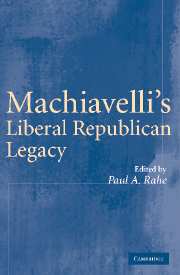Book contents
- Frontmatter
- Contents
- List of Contributors
- Acknowledgments
- Abbreviations and Brief Titles
- Introduction: Machiavelli's Liberal Republican Legacy
- Prologue: Machiavelli's Rapacious Republicanism
- PART I THE ENGLISH COMMONWEALTHMEN
- PART II THE MODERATE ENLIGHTENMENT
- PART III THE AMERICAN FOUNDING
- 7 The American Prince? George Washington's Anti-Machiavellian Moment
- 8 John Adams's Machiavellian Moment
- 9 Thomas Jefferson's Machiavellian Political Science
- 10 James Madison's Princes and Peoples
- 11 Was Alexander Hamilton a Machiavellian Statesman?
- Index
7 - The American Prince? George Washington's Anti-Machiavellian Moment
Published online by Cambridge University Press: 24 July 2009
- Frontmatter
- Contents
- List of Contributors
- Acknowledgments
- Abbreviations and Brief Titles
- Introduction: Machiavelli's Liberal Republican Legacy
- Prologue: Machiavelli's Rapacious Republicanism
- PART I THE ENGLISH COMMONWEALTHMEN
- PART II THE MODERATE ENLIGHTENMENT
- PART III THE AMERICAN FOUNDING
- 7 The American Prince? George Washington's Anti-Machiavellian Moment
- 8 John Adams's Machiavellian Moment
- 9 Thomas Jefferson's Machiavellian Political Science
- 10 James Madison's Princes and Peoples
- 11 Was Alexander Hamilton a Machiavellian Statesman?
- Index
Summary
Over the course of the American founding, there was hardly a moment when George Washington was not in a position of authority and influence. The de facto leader of the colonial struggle, the personification of the American Revolution as military commander, constitution-maker, and president, he was early on considered “the father of his country.” By the time of his death, many spoke of the era as nothing less than “the age of Washington.”
In a private letter written soon after becoming the first president, Washington recorded his thoughts on the beginning of the new nation: “It was to be, in the first instance, in a considerable degree a government of accommodation as well as a government of Laws. Much was to be done by prudence, much by conviction, much by firmness.” He fully understood the unique part he played in the American founding; more often than not it was his prudence, his conviction, and his firmness that carried the day. He also knew that circumstances demanded the prudence, convictions, and firmness of one man. “In our progress towards political happiness my station is new; and, if I may use the expression, I walk on untrodden ground,” he wrote. “Few who are not philosophic spectators can realize the difficult and delicate part which a man in my situation had to act” (WrGW 30:495–6; emphasis added).
- Type
- Chapter
- Information
- Machiavelli's Liberal Republican Legacy , pp. 170 - 188Publisher: Cambridge University PressPrint publication year: 2005



